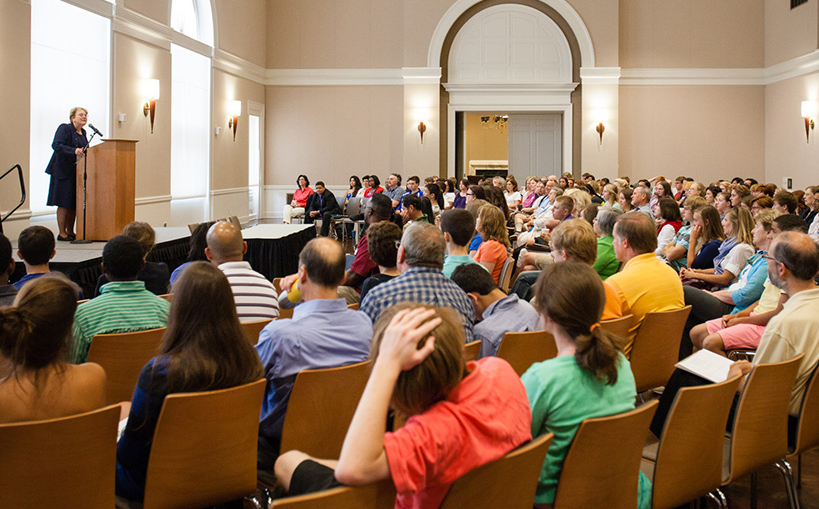Beginning the college search for high school students and their families can be daunting, even for parents who work at a university. With this challenge in mind, the deans in the Office of Undergraduate Admission at the University of Virginia created the Employee Family Admission Program last year to provide support to them during the college search and application process.
This year, 235 U.Va. employees and their high school-age children participated in the second annual program, a half-day event held in Newcomb Ballroom that featured admissions, financial aid and athletics information.
Dean of Admission Greg Roberts welcomed the participants and thanked employees for their service to U.Va. “We believe this program is important for many reasons,” he said. “The most important of which is because you are so important to us and to this University.”
President Teresa A. Sullivan also greeted employees and their families and, speaking from her own experience as the parent of two college graduates, encouraged them to learn about the college application process early. “It should be an exciting and illuminating process but sometimes it can be a little stressful,” she said.
Modeled after the Alumni Family Program, a day-and-a-half-long event in which alumni and their children learn about the college admission process, the Employee Family Program was designed to educate U.Va. employees whose children want to apply to college.
Lee Politis, an associate dean in admission, explained that the latest program was conceived as a service to employees. “We thought … ‘As long as we’re sitting right here and we can educate people about the process, why not do it?’”
For the Employee Family Program, admission deans collaborated with representatives from the Financial Aid Office, AccessUVa and the Department of Athletics to provide essential insights into college admission, financial aid and eligibility requirements for recruitment and athletic programs.
“This program is the abridged version … we get right down to the important stuff, which is the conversation we have about the college search process and the college admissions process,” Roberts said.
The admissions office also invited several recent high school graduates and a college counselor from a local high school to shed light on visiting and applying to colleges.
Student panelist Tiffany Ames reflected on the importance of programs like this one, which offer tools and tips to prepare students to apply to college. “This is definitely a good experience for any high-schooler no matter what age they are.”
She and other student panelists also discussed their experiences with Common Application deadlines and college essay writing.
“Having something like this [program] where they lay out step-by-step what you’re supposed to do and when you’re supposed to do it will help every kid in that room,” said Ames in follow-up remarks after the panel. She plans to attend Oberlin College in Ohio in the fall to study music and theater.
Employees and their children also got a chance to take a closer look at how college admissions officers read applications and decide what applicants will eventually come to their school. Guided by U.Va. admission deans and counselors, employees and their students participated in a mock admissions workshop.
Working together in small groups, the students and their parents examined four applications and discussed which two applicants they would admit to U.Va. based on their own evaluation of transcripts, essays, coursework and recommendations from each of the applicants.
“I think that the case studies tend to be the most popular part of the program because it allows students and parents to serve as an admission committee and have discussions like we do and to see the complexity of the applications,” Roberts said.
For students, the case studies provided a chance for them and their families to get an insider’s perspective on the conversations that admission deans have every year as they read the applications of prospective students. After evaluating the mock admissions cases, many students and their parents felt they gained a deeper appreciation for the admissions process.
Joli Millner, a student at Albemarle High School, said, “I see why [admissions counselors] decide why certain kids should get in and others shouldn’t.”
She and her brother, Kai, attended the half-day session with their mother, Sharon Millner, a speech pathologist at the Health System’s Transitional Care Hospital. All three found the mock admissions exercise “eye-opening.”
“The program was helpful because it validated what I express to my children about the importance of getting good grades and choosing higher-level classes,” said Millner in a follow-up email.
Sanda Iliescu, an associate professor of art and architecture in the School of Architecture, who attended the event with her son, also praised the positive reinforcement that the program provided for employees and their families on the subject of the college admissions process.
“Most importantly, [the program] gave the right sort of messages – ethically and intellectually – to both children and parents … Goodness, hard work and intellectual search are their own great rewards, in high school and beyond, for young and old alike,” she said in an email. “I was really gratified to see this attitude be emphasized to us during the event yesterday.”
— by Dana Cypress
Media Contact
Article Information
June 17, 2013
/content/uva-offers-workshop-applying-college-students-uva-employees

